2022/23 concert season at Congress Theatre

Where music takes you


2022/23 concert season at Congress Theatre


Principal Conductor Edward Gardner supported by Aud Jebsen
Principal Guest Conductor Karina Canellakis
Conductor Emeritus Vladimir Jurowski Patron HRH The Duke of Kent KG
Artistic Director Elena Dubinets Chief Executive David Burke
Leader Pieter Schoeman supported by Neil Westreich
Congress Theatre, Eastbourne

Sunday 16 April 2023 | 3.00pm
Mendelssohn
Hebrides Overture (10’)
Dvořák
Violin Concerto in A minor (31’)
Interval (20’)
Brahms
Symphony No. 3 in F major (33’)
Chloé van Soeterstède conductor
Tai Murray violin
The timings shown are not precise and are given only as a guide. Concert presented by the London Philharmonic Orchestra in association with Eastbourne Borough Council
Contents
3
6
 Theatre Director Chris Jordan
Theatre Director Chris Jordan
Welcome to this afternoon’s performance – the final concert in the London Philharmonic Orchestra’s 2022/23 season at the Congress Theatre. As always, we are pleased to welcome back the London Philharmonic Orchestra and its patrons to the Congress Theatre. Whether this is your first visit or you are a season regular, we hope you enjoy your experience at our venue.
Details of the LPO’s 2023/24 season will be announced soon. Keep an eye out for the new season brochure and at lpo.org.uk/eastsussex. You can also find out what’s coming up by signing up for our ‘Stay in touch’ newsletter via the eastbournetheatres.co.uk homepage.
The Congress Theatre and the London Philharmonic Orchestra have a wonderful history together: the LPO gave the first ever performance at this Grade II listed building when it originally opened in 1963, and the first performance when it re-opened after refurbishment in 2017. The Orchestra has now performed over 350 concerts here, and as it celebrates its 90th anniversary this season we look forward to strengthening our relationship even further in the years to come and creating many more musical memories together.
The historic theatre in which you are now seated is unique in that it is conceived to be a perfect cube and has fantastic acoustics to enhance your experience of live music.
We thank you for continuing to support the concert series. Please sit back in your seats and enjoy the concert and your visit here. As a courtesy to others, please ensure mobile phones are switched off during the performance. Please also note that photography and recording are not allowed in the auditorium unless announced from the stage. Thank you.
Fancy playing alongside LPO musicians and members of our Junior Artists and Foyle Future Firsts schemes? If you’re between 10 and 14 years old and play an orchestral instrument at Grade 3+ standard, this is your chance to join the London Philharmonic Orchestra family for a day. You’ll meet some of our musicians, play as an ensemble and find out just what it takes to be part of one of the greatest orchestras in the world –for free!
This summer we’re bringing Overture to Eastbourne for the very first time. The Overture Day will take place at Ratton School, Eastbourne BN21 2XL on Tuesday 25 July 2023, and we’re excited to be working in partnership with Create Music, the music hub lead for Brighton and East Sussex. For our Overture Days, applications are prioritised from young people from backgrounds currently under-represented in professional UK orchestras. Applications for 25 July will open soon, so keep an eye out at lpo.org.uk/overture
Following rave reviews for the first volume of Vladimir Jurowski’s Stravinsky series on the LPO Label last year, we’re thrilled to release the next volume later this month.
‘Jurowski conducts Stravinsky Vol. 2’ (LPO-0026) is available to pre-order now, and will be in stores and on streaming services from 28 April. It features Stravinsky’s ballet music for The Fairy’s Kiss, alongside the movements he orchestrated from Tchaikovsky’s fairytale ballet The Sleeping Beauty

Click on the QR code to pre-order now or find out more.

‘The early evolution of Stravinsky from fledgling to Firebird feels like the most natural thing in the world ... The instinct and intellect of this most inquisitive and searching of conductors makes all the right connections.’
Gramophone on ‘Jurowski conducts Stravinsky Vol. 1’ (Editor’s Choice, September 2022)
First Violins
Alice Ivy-Pemberton Leader
Lasma Taimina
Chair supported by Irina Gofman & Mr Rodrik
V. G. Cave
Minn Majoe
Catherine Craig
Ronald Long
Elizaveta Tyun
Katherine Waller
Amanda Smith
Nilufar Alimaksumova
Maria Fiore Mazzarini
Maeve Jenkinson
Eleanor Bartlett
Second Violins
June Lee Guest Principal
Kate Birchall
Fiona Higham
Chair supported by David & Yi Buckley
Ashley Stevens
Sioni Williams
Sheila Law
Emma Purslow
Alison Strange
Jessica Coleman
Caroline Heard
Violas
Jon Thorne Guest Principal
Martin Wray
Katharine Leek
Benedetto Pollani
Toby Warr
Linda Kidwell
Stanislav Popov
Alistair Scahill
Cellos
Kate Gould Guest Principal
Francis Bucknall
Susanna Riddell
Helen Thomas
Laura Donoghue
Jane Lindsay
Double Basses
Kevin Rundell* Principal
Sebastian Pennar Co-Principal
Hugh Kluger
George Peniston
Flutes
Stewart McIlwham* Principal
Camilla Marchant
Oboes
Ian Hardwick* Principal
Hannah Condliffe
Clarinets
Benjamin Mellefont Principal
Thomas Watmough
Chair supported by Roger Greenwood
Paul Richards*
Bassoons
John McDougall Guest Principal
Emma Harding
Contrabassoon
Simon Estell* Principal
Horns
John Ryan* Principal
Martin Hobbs
Mark Vines Co-Principal
Gareth Mollison
Oliver Johnson
Trumpets
Paul Beniston* Principal
Anne McAneney*
Trombones
Mark Templeton* Principal
Chair supported by William & Alex de Winton
David Whitehouse
Bass Trombone
Lyndon Meredith Principal
Timpani
Simon Carrington* Principal
Chair supported by Victoria Robey OBE
* Holds a professorial appointment in London
The LPO also acknowledges the following chair supporters whose players are not present at this concert:
Gill & Garf Collins
Sonja Drexler
Friends of the Orchestra
Dr Barry Grimaldi
Sir Simon Robey
Bianca & Stuart Roden
Caroline, Jamie & Zander Sharp
Eric Tomsett
Neil Westreich

Uniquely groundbreaking and exhilarating to watch and hear, the London Philharmonic Orchestra has been celebrated as one of the world’s great orchestras since Sir Thomas Beecham founded it in 1932. With every performance we aim to bring wonder to the modern world and cement our position as a leading orchestra for the 21st century.
Our home is at the Southbank Centre’s Royal Festival Hall, where we’re at the beating heart of London’s cultural life. You’ll also find us at our resident venues here in Eastbourne, in Brighton, and in Saffron Walden, and on tour throughout the UK and internationally, performing to sell-out audiences worldwide. Each summer we’re resident at Glyndebourne Festival Opera, combining the magic of opera with Glyndebourne’s glorious setting in the Sussex countryside.
We’re always at the forefront of technology, finding new ways to share our music globally. You’ll find us online, on streaming platforms, on social media and through our broadcast partnership with Marquee TV. During the pandemic period we launched ‘LPOnline’: over 100 videos of performances, insights and introductions to playlists, which led to us being named runner-up in the Digital Classical Music Awards 2020. During 2022/23 we’ll be working once again with Marquee TV to broadcast selected live concerts, so you can share or relive the wonder from your own living room.
Our Principal Conductors have included some of the greatest historic names like Sir Adrian Boult, Bernard Haitink, Sir Georg Solti, Klaus Tennstedt and Kurt Masur. In 2021 Edward Gardner became our 13th Principal Conductor, taking the Orchestra into its tenth decade. Vladimir Jurowski became Conductor Emeritus in recognition of his impact as Principal Conductor from 2007–21. Karina Canellakis is our current Principal Guest Conductor and Brett Dean our Composer-in-Residence.
Everyone will have heard the London Philharmonic Orchestra, whether it’s playing the world’s National Anthems at every medal ceremony of the London 2012 Olympics and Paralympics, our iconic recording with Pavarotti that made Nessun Dorma a global football anthem, or closing the flotilla at The Queen’s Thames Diamond Jubilee Pageant. And you’ll almost certainly have heard us on the soundtracks for major films including The Lord of the Rings
We also release live, studio and archive recordings on our own label, and are the world’s most-streamed orchestra, with over 15 million plays of our content each month. Recent releases include the first volume of a Stravinsky series with Vladimir Jurowski; Tippett’s complete opera The Midsummer Marriage under Edward Gardner, captured in his first concert as
LPO Principal Conductor in September 2021; and James MacMillan’s Christmas Oratorio, recorded at the work’s UK premiere performance in December 2021.
We’re committed to inspiring the next generation of musicians and music-lovers: there’s nothing we love more than seeing the joy of children and families enjoying their first musical moments, and we’re passionate about equipping schools and teachers through schools’ concerts, resources and training. Reflecting our values of collaboration and inclusivity, our OrchLab and Open Sound Ensemble projects offer music-making opportunities for adults and young people with special educational needs and disabilities.
Today’s young instrumentalists are the orchestral members of the future, so we’re committed to offering them opportunities to progress. Our LPO Junior Artists programme is leading the way in creating pathways into the profession for young artists from under-represented communities, and our LPO Young Composers and Foyle Future Firsts schemes support the next generation of professional musicians, bridging the transition from education to professional careers.
We believe in the relevance of our music, and that our programmes must reflect the narratives of modern times. This season we’re exploring themes of belonging and displacement in our series ‘A place to call home’, delving into music by composers including Austrians Erich Korngold and Paul Hindemith, Hungarian Béla Bartók, Cuban Tania León, Ukrainian Victoria Vita Polevá and Syrian Kinan Azmeh. As we celebrate our 90th anniversary we perform works premiered by the Orchestra during its illustrious history. This season also marks Vaughan Williams’s 150th anniversary and we’ll be celebrating with four of his works, as well as both symphonies by Elgar and music by Tippett and Thomas Adès. Our commitment to everything new and creative includes premieres by Brett Dean and Heiner Goebbels, as well as new commissions from composers from around the world including Agata Zubel, Elena Langer and Vijay Iyer.
lpo.org.uk
Alice Ivy-Pemberton joined the London Philharmonic Orchestra as Co-Leader in February 2023.
Praised by The New York Times for her ‘sweet-toned playing’, Alice has performed as a soloist, chamber and orchestral musician to international acclaim. While growing up in New York City and studying with Nurit Pacht, Alice made a nationally televised Carnegie Hall debut aged ten, and was a finalist at the Menuhin International Competition at the age of 12.
Alice earned her Bachelors and Masters degrees at The Juilliard School under the tutelage of Itzhak Perlman and Catherine Cho as a fully-funded recipient of the Kovner Fellowship. During her studies she won Juilliard’s Violin Concerto Competition, performed extensively with the New York Philharmonic and The Philadelphia Orchestra, and led orchestras under the baton of Barbara Hannigan, Xian Zhang and Matthias Pintscher. Upon graduating in 2022 she was awarded the Polisi Prize and a Benzaquen Career Advancement Grant in recognition of ‘tremendous talent, promise, creativity, and potential to make a significant impact in the performing arts’.
An avid chamber musician, Alice has collaborated with Itzhak Perlman, Anthony Marwood, Gil Shaham and members of the Belcea, Doric, Juilliard and Brentano string quartets, and performed with the Chamber Music Society of Lincoln Center. Festival appearances include Music@Menlo, Moritzburg and Yellow Barn. Also a passionate advocate for new music and its social relevance, Alice created Drowning Monuments, a noted multimedia project on climate change that brought together five world premieres for solo violin.

awarded the Bärenreiter Prize for the best interpretation of a contemporary work, as well as Third Prize overall.
In 2012 Chloé founded the Arch Sinfonia, a chamber orchestra based in London, which has been applauded for its vibrant and boundless energy, its wide range of repertoire and its initiatives to build bridges between artists and audience. She also loves to work with young musicians, and as such works regularly with specialist music schools and conservatoires across the UK.
Chloé van Soeterstède is attracting the attention of orchestras across the globe for her intuitive, sensitive, expressive music-making and her commanding and positive presence on the podium. She is praised repeatedly for her attention to detail, her energy and enthusiasm, and efficiency in rehearsal. In recent seasons she has made many debuts across Europe and North America, receiving many re-invitations, and in upcoming seasons she looks forward to further debuts in the UK, Scandinavia, Germany, Switzerland, the US, New Zealand and Australia. In January 2022 she joined the Orchestre d’Auvergne’s artistic team as Artist-inResidence, alongside its Associate Conductors Enrico Onofri and Christian Zacharias, and Chief Conductor Thomas Zehetmair.
Today’s concert is Chloé van Soeterstède’s debut with the London Philharmonic Orchestra. This season she also makes debuts with the Scottish Chamber, Finnish Radio Symphony, Geneva Chamber and Nordic Chamber orchestras, amongst others, and returns to the Royal Philharmonic, Bournemouth Symphony and Gävle Symphony orchestras, the Orquesta Sinfónica de Castilla y Léon, and the GiOrquesta for a production with La Fura dels Baus at the Portaferrada Festival.
Chloé van Soeterstède conducts a wide range of repertoire from Mozart, Beethoven and Mendelssohn through to Tchaikovsky, Ravel and Prokofiev. In 2019 she conducted the world premiere of Benjamin Attahir’s Syrian Voices in France, and she regularly programmes works by contemporary composers such as Jessie Montgomery, Roxanna Panufnik, Annamaria Kowalsky, Katarine Leyman and Anna Meredith. At the 2019 Deutscher Diringentenpreis in Cologne she was
Chloé van Soeterstède was born in 1988 in France. After studying viola in Paris and then at the Royal Academy of Music, she studied conducting at the Royal Northern College of Music (2015–17) with Clark Rundell and Mark Heron, where she was awarded the Kennedy scholarship and was also supported by the Derek Hill Foundation. She was appointed the Taki Alsop Fellow 2019–21 by Marin Alsop, and was a Dudamel Fellow with the LA Philharmonic in the 2021/22 season.

Tai Murray’s critically-acclaimed debut recording for Harmonia Mundi of Ysaÿe’s six sonatas for solo violin was released in 2012. Her second recording, ‘20th Century – The American Scene’ with pianist Ashley Wass, was released by the Berlin-based label eaSonus in 2013, and her third disc, ‘American Journey’, featuring Bernstein’s Serenade, by the French label Mirare in 2014.
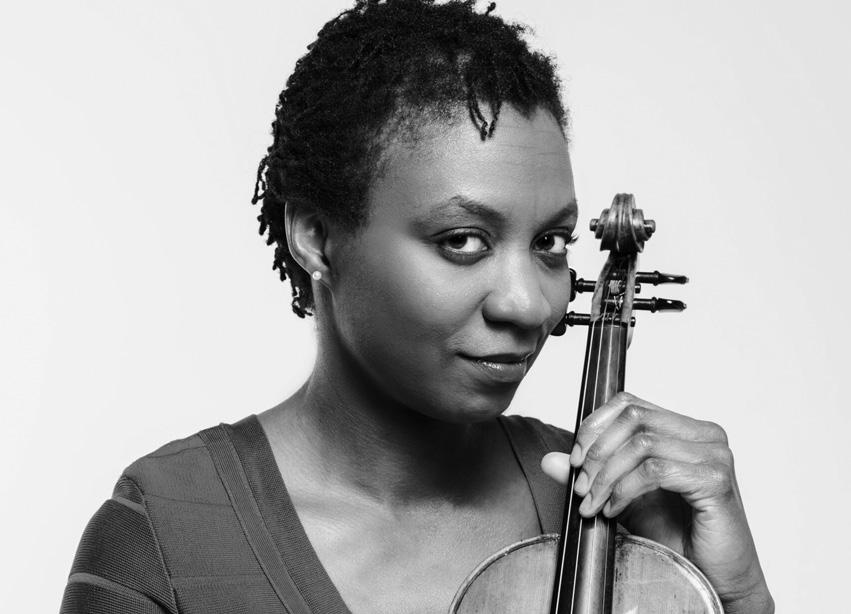
Tai Murray plays a violin by Tommaso Balestrieri Fecit Mantua ca. 1765, on generous loan from a private collection.
Described as ‘superb’ by The New York Times, American violinist Tai Murray has established herself as the musical voice of a generation. ‘Technically flawless … vivacious and scintillating … It is without doubt that Murray’s style of playing is more mature than that of many seasoned players.’ (Muso Magazine)
Appreciated for her elegance and effortless ability, Tai creates a special bond with listeners through her personal phrasing and subtle sweetness. Her programming reveals musical intelligence, and her sound, sophisticated bowing and choice of vibrato remind us of her musical background and influences, principally Yuval Yaron (a student of Gingold and Heifetz) and Franco Gulli. Winner of an Avery Fisher Career Grant in 2004, Tai Murray was a BBC New Generation Artist from 2008–10. As a chamber musician, she was a member of Lincoln Center’s Chamber Music Society from 2004–06.
Tai has performed as guest soloist on stages worldwide, with leading ensembles such as the Indianapolis Symphony Orchestra, Royal Liverpool Symphony Orchestra, and all of the BBC symphony orchestras. Today’s concert is her debut with the London Philharmonic Orchestra. Tai is also a dedicated advocate of contemporary works written for the violin: among others, she gave the world premiere of Malcolm Hayes’s Violin Concerto at the 2016 BBC Proms, with the BBC National Orchestra of Wales conducted by Thomas Søndergård
As a recitalist, Tai Murray has visited many of the world’s capitals, appearing in Berlin, Chicago, Hamburg, London, Madrid, Paris, Washington D.C. and New York’s Carnegie Hall, among many others.

1809–47
1830
In 1829, the 20-year-old Felix Mendelssohn made his first visit to Britain. He was awestruck by London: ‘the grandest and most complicated monster on the face of the earth’, he wrote to his family, back in Berlin. Then, with his older friend Karl Klingemann, he set off for Scotland. Edinburgh delighted his romantic imagination: ‘Few of my Switzerland reminiscences can compare to this; everything looks so stern and robust, half enveloped in haze or smoke or fog’. The idea of composing a ‘Scottish’ Symphony was born around this time. On the other hand, a visit to the world-famous novelist Sir Walter Scott at his home at Abbotsford was something of an anticlimax: ‘We drove eighty miles and lost a day for the sake of at best one half-hour of superficial conversation’.
Then, in August, came the encounter that yielded the richest musical results. Klingemann and Mendelssohn made the long, difficult land-sea journey to the Hebridean islands. Mendelssohn was overwhelmed by the dramatic coastal scenery, especially the island of Staffa, with its huge sea cave, framed by vast basaltic columns – according to legend the abode of the legendary hero Fingal. ‘In order to make you understand how extraordinarily the Hebrides affected me’, he wrote home, ‘the following came to my mind there’. And in the letter, underneath those words, is a sketch for what is unmistakably the opening of the Hebrides Overture, with its short but pregnant repeated motif for violas, cellos and bassoon. From this grew one of the greatest of all romantic tone-poems.
Broadly speaking, Mendelssohn keeps to the outlines of classical ‘sonata form’: two contrasting themes, both recapitulated after a powerful central ‘development’ section. But what is most impressive about the Overture is its sustained imaginative flight. One moment huge open vistas are evoked, the next we are offered musical ‘close-ups’ of waves dashing against rocks or scudding storm clouds; and always in the background is the swell of the sea, rising to a thrilling final climax before fading
mysteriously at the end. ‘The best I have to tell you’, Mendelssohn wrote after that enthralling sea voyage, ‘is described exactly in the music’. And nearly two centuries later, the Hebrides Overture tells that story as vividly as ever.

1841–1904
Violin Concerto in A minor, Op. 53
1894–95
Tai Murray violin
1 Allegro ma non troppo –
2 Adagio ma non troppo
3 Finale: Allegro giocoso ma non troppo
Antonín Dvořák’s great Cello Concerto is one of the most widely loved and admired string concertos in the repertoire. But its enduring success has tended to overshadow his other works in concerto form. In the case of the relatively early Piano Concerto (1876), that’s no great loss. Dvořák himself appears to have concluded that it was largely a failure, and few have disagreed with him. But the Violin Concerto of 1879–80 is another matter entirely. Full of catchy tunes and glorious long melodies, it has a warmly romantic atmosphere of its own. And although Dvořák doesn’t overdo the folk colouring, the finale in particular has an unmistakable and delicious Czech accent.
Dvořák wrote his Violin Concerto for the Hungarian virtuoso Joseph Joachim, who apart from being one of the outstanding concert soloists of his age was also a fine composer and a folk music enthusiast. It was for Joachim that Dvořák’s friend and champion Johannes Brahms had written his great Violin Concerto in 1878. In the case of the Brahms Concerto, Joachim had made several helpful suggestions to the composer, not just about the violin writing, but also about orchestration and even some of the details of the composition, some (though not all) of which Brahms accepted. Dvořák duly sent off his own score to Joachim with a request that he run a critical eye over his efforts. Dvořák had to wait two years until Joachim sent back his recommendations –all of which he seems to have been happy to accept. Yet, strangely, Joachim never played Dvořák’s Violin Concerto – quite why we can only guess – and the
premiere was eventually given in 1883 by the Czech violinist František Ondříček in Prague.
Perhaps the problem for Joachim, and for one or two more self-conscious star violinists today, is that the Dvořák is not an especially ‘showy’ concerto. It’s certainly difficult to play, but for listeners it tends to be the soulful or dancing melodic element that remains in the memory rather than any virtuoso fireworks. The first movement begins arrestingly, with a stern orchestral theme. But this movement is more songful than dramatic, and its true heart is the glorious long melody, introduced by the soloist supported by the oboe, that flows in seamlessly about halfway through the movement. There is no extended solo cadenza: just when it seems that the violin is setting off on an earcatching monologue, woodwind join in and lead smoothly into the slow movement, which begins with another seductive long melody. This extended lyrical meditation eventually brings the Concerto to its first full close. Then the finale begins with a tribute to a Czech national dance, the ‘furiant’. The furiant’s most striking feature is its rhythm, which keeps veering between ONE-two-three TWO-two-three and ONE-two TWOtwo THREE-two – the kind of rhythmic writing that literally keeps dancers (and violinists) on their toes. But for the listener at least this is joyous music, not least in its exciting close.
An announcement will be made five minutes before the end of the interval.
1833–97
1883
1 Allegro con brio
2 Andante
3 Poco Allegretto
4 Allegro
Brahms’s Third Symphony is in many ways the subtlest, certainly the least ‘epic’ of his symphonic works. Notice the way that all four movements conclude quietly – it’s hard to think of a symphony composed before this one totally avoids demonstrative endings. Sometimes –especially in the middle two movements – the style and expression are closer to chamber music: there are intimate dialogues between solo woodwind instruments, while the beautiful long horn solo in the third movement, with its delicate string accompaniment, is closer in style to the gloriously romantic Horn Trio of 1865 than to anything in the other three symphonies.
Beyond that, the older Brahms’s habitual mask of ‘classical objectivity’ slips more often here than in any of his other big orchestral works. The Third Symphony begins with the wind instruments outlining a rising three-note motif which dominates the first movement and returns to wind up the argument at the end of the finale: all very intellectually rigorous, one might say –typical Brahms. Un-typically, however, Brahms indicated that this motif had a specific meaning: the three notes, F–A–F, ‘spelt’ a motto in German, Frei aber froh –‘Free but happy’ – an expression of proud defiance, perhaps, by famously lifelong bachelor. But listen to the way Brahms flattens the second note of the opening motif, A, and adds a questioning dissonance underneath. The word aber (‘but’) is therefore emphasised – a note of doubt.
Immediately after this ‘motto’ comes a magnificent downward plunging violin theme. Its opening phrase is
a direct quotation from another Third Symphony: that of the young Brahms’s mentor, encourager and in many ways surrogate father, Robert Schumann. Schumann’s final descent into madness and attempted suicide in 1854 was a profound shock for Brahms. Most of Brahms’s first movement is carried along by a strong, buoyant forward current; but just before the return of the first themes the tempo slows markedly and Brahms quotes one of his own choral works, Begräbnisgesang, ‘Funeral Song’, composed not long after Schumann’s death – listen out for heavy descending scales in the bass, lugubriously scored. Suddenly the opening F–A–F motif returns with full force. It’s as though Brahms pays momentary tribute to his beloved, and still profoundly missed friend, but then rallies himself. Schumann may be no more, but his spirit lives on in Brahms himself –as Schumann himself prophesied.
The middle two movements are much gentler, and scored for reduced forces (no trumpets, drums or contrabassoon). The opening woodwind melody of the Andante, with its answering phrases on low strings, is like a pastoral hymn, but the more searching second theme (clarinet, bassoon with rich supporting string chords) leads into more troubled regions. Pastoral imagery is also suggested in the following Poco Allegretto. The rustling string figures accompaniment the gorgeous cello melody may evoke rustling foliage. The idea of a prevailing forest setting is confirmed when the opening melody is taken up at length by the horn –for German-speaking composers the horn is the romantic woodland instrument. Continued overleaf
The finale brings the stormiest, most driven music in the whole Symphony, though the darkly purposeful opening is momentarily interrupted by a kind of brief reverie (woodwind against more rustling strings), followed by a sombre hymn-like figure, pianissimo – more ‘funeral’ music? From this an impassioned, striving Allegro springs to life. One may be led to expect a noisily triumphant, or perhaps tragic conclusion. But at the end it is the element of reverie (again woodwind and rustling strings) that prevails, leading – with superb emotional logic – to a quite return of the Symphony’s original ‘motto’ and ‘Schumann’ themes. No triumph, no tragedy, the music seems to say – just peaceful acceptance.
Programme notes © Stephen Johnson
Help us to share the wonder of the LPO by making a donation today. Use the QR code to donate via the LPO website, or visit lpo.org.uk/donate. Thank you.



Brahms Symphony No. 3
Brahms Symphony No. 4

Vladimir Jurowski conductor
London Philharmonic Orchestra
LPO-0075
Recorded live at the Southbank Centre’s Royal Festival Hall on 27 October 2010 (No. 3) and 28 May 2011 (No. 4)
Andrew Clark, Financial Times, 24 January 2014
All LPO Label releases are available to buy on CD, and to download or stream via Spotify, Apple Music, Idagio and others. Scan the QR code above to listen now or find out more.
‘The London Philharmonic Orchestra’s strings combine passion and poise, the woodwinds are exquisite, and Jurowski accepts the music as a lyrical outpouring ... the LPO’s principal conductor marries the best of tradition with the best of modern practice.’
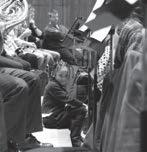



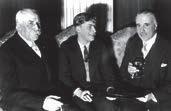



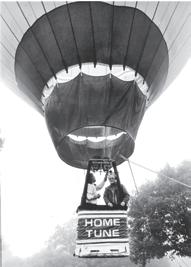


We cherish our heritage and are committed to keeping the next 90 years exciting, dynamic and inclusive. Donate now, as we continue to make history in the present by offering life-enriching musical experiences for everyone, investing in the next generation of talent, commissioning masterworks of the future and reaching more communities around the UK, especially in Brighton and Eastbourne.
















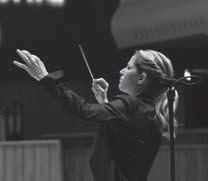



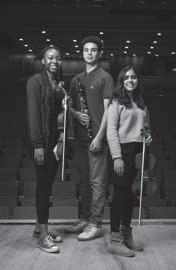

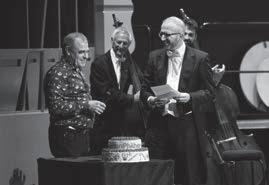
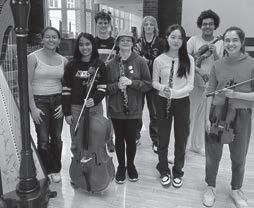

We are extremely grateful to all donors who have given generously to the LPO over the past year. Your generosity helps maintain the breadth and depth of the LPO’s activities, as well as supporting the Orchestra both on and off the concert platform.
Anonymous donors
Mrs Aline Foriel-Destezet
Aud Jebsen
In memory of Mrs Rita Reay
Sir Simon & Lady Robey OBE
Orchestra Circle
William & Alex de Winton
Patricia Haitink
Mr & Mrs Philip Kan
TIOC Foundation
Neil Westreich
The American Friends of the London Philharmonic Orchestra
Principal Associates
Richard Buxton
Gill & Garf Collins
In memory of Brenda Lyndoe
Casbon
In memory of Ann Marguerite
Collins
Sally Groves MBE
George Ramishvili
Associates
Mrs Irina Andreeva
In memory of Len & Edna Beech
Steven M. Berzin
Ms Veronika BorovikKhilchevskaya
The Candide Trust
John & Sam Dawson
Irina Gofman & Mr Rodrik V. G.
Cave
The Lambert Family Charitable
Trust
Stuart & Bianca Roden
In memory of Hazel Amy Smith
The Tsukanov Family
The Viney Family
Gold Patrons
An anonymous donor
Chris Aldren
David & Yi Buckley
In memory of Allner Mavis
Channing
Sonja Drexler
Jan & Leni Du Plessis
The Vernon Ellis Foundation
Peter & Fiona Espenhahn
Hamish & Sophie Forsyth
Mr Roger Greenwood
Malcolm Herring
John & Angela Kessler
Julian & Gill Simmonds
Eric Tomsett
Andrew & Rosemary Tusa
Guy & Utti Whittaker
Mr Florian Wunderlich
Silver Patrons
Dame Colette Bowe
David Burke & Valerie Graham
Bruno De Kegel
Ulrike & Benno Engelmann
Virginia Gabbertas MBE
Dmitry & Ekaterina Gursky
The Jeniffer & Jonathan Harris
Charitable Trust
Catherine Høgel & Ben Mardle
Sir George Iacobescu
Jamie & Julia Korner
Mr & Mrs Makharinsky
Mr Nikita Mishin
Andrew Neill
Tom & Phillis Sharpe
Mr & Mrs John & Susi Underwood
Laurence Watt
Bronze Patrons
Anonymous donors
Michael Allen
Mr Mark Astaire
Nicholas & Christine Beale
Mikhail Noskov & Vasilina Bindley
Mr Anthony Blaiklock
Lorna & Christopher Bown
Mr Bernard Bradbury
Simon Burke & Rupert King
Desmond & Ruth Cecil
Mr Evgeny Chichvarkin
Mr John H Cook
Georgy Djaparidze
Deborah Dolce
Cameron & Kathryn Doley
Mariana Eidelkind & Gene
Moldavsky
David Ellen
Ben Fairhall
Mr Richard & Helen Gillingwater
Mr Daniel Goldstein
David & Jane Gosman
Mr Gavin Graham
Lord & Lady Hall
Mrs Dorothy Hambleton
Iain & Alicia Hasnip
Martin & Katherine Hattrell
Michael & Christine Henry
Mr Steve Holliday
J Douglas Home
Mr & Mrs Ralph Kanza
Mrs Elena & Mr Oleg Kolobov
Rose & Dudley Leigh
Wg. Cdr. & Mrs M T Liddiard OBE
JP RAF
Drs Frank & Gek Lim
Mr Nicholas Little
Geoff & Meg Mann
Mrs Elizabeth Meshkvicheva
Andrew T Mills
Peter & Lucy Noble
Mr Roger Phillimore
Mr Michael Posen
Mr Anthony Salz
Ms Nadia Stasyuk
Charlotte Stevenson
Mr Joe Topley & Ms Tracey
Countryman
Mr & Mrs John C Tucker
Timothy Walker CBE AM
Jenny Watson CBE
Grenville & Krysia Williams
Anonymous donors
Dr Manon Antoniazzi
Julian & Annette Armstrong
Mr John D Barnard
Mr Geoffrey Bateman
Mr Philip Bathard-Smith
Mrs A Beare
Dr Anthony Buckland
Dr Simona Cicero & Mr Mario
Altieri
Mr Peter Coe
Mrs Pearl Cohen
David & Liz Conway
Mr Alistair Corbett
Ms Mary Anne Cordeiro
Ms Elena Dubinets
Mr Richard Fernyhough
Jason George
Mr Christian Grobel
Prof Emeritus John Gruzelier
Mark & Sarah Holford
Mrs Maureen Hooft-Graafland
Per Jonsson
Mr Ian Kapur
Ms Kim J Koch
Ms Elena Lojevsky
Mrs Terry Neale
John Nickson & Simon Rew
Oliver & Josie Ogg
Ms Olga Ovenden
Mr James Pickford
Filippo Poli
Sir Bernard Rix
Mr Robert Ross
Priscylla Shaw
Martin & Cheryl Southgate
Mr & Mrs G Stein
Dr Peter Stephenson
Joanna Williams
Christopher Williams
Ms Elena Ziskind
Supporters
Anonymous donors
Ralph & Elizabeth Aldwinckle
Mr & Mrs Robert Auerbach
Mrs Julia Beine
Harvey Bengen
Miss YolanDa Brown OBE
Miss Yousun Chae
Mr Julien Chilcott-Monk
Alison Clarke & Leo Pilkington
Mr Joshua Coger
Miss Tessa Cowie
Mr David Devons
Patricia Dreyfus
Mr Martin Fodder
Christopher Fraser OBE
Will Gold
Ray Harsant
Mr Peter Imhof
The Jackman Family
Mr David MacFarlane
Dame Jane Newell DBE
Mr Stephen Olton
Mari Payne
Mr David Peters
Ms Edwina Pitman
Mr & Mrs Graham & Jean Pugh
Mr Giles Quarme
Mr Kenneth Shaw
Mr Brian Smith
Ms Rika Suzuki
Tony & Hilary Vines
Dr June Wakefield
Mr John Weekes
Mr C D Yates
Hon. Benefactor
Elliott Bernerd
Hon. Life Members
Alfonso Aijón
Kenneth Goode
Carol Colburn Grigor CBE
Pehr G Gyllenhammar
Robert Hill
Victoria Robey OBE
Mrs Jackie Rosenfeld OBE
Timothy Walker CBE AM
Laurence Watt
David & Yi Buckley
Gill & Garf Collins
William & Alex de Winton
Sonja Drexler
The Friends of the LPO
Irina Gofman
Roger Greenwood
Dr Barry Grimaldi
Mr & Mrs Philip Kan
John & Angela Kessler
Sir Simon Robey
Victoria Robey OBE
Bianca & Stuart Roden
Caroline, Jamie & Zander Sharp
Julian & Gill Simmonds
Eric Tomsett
Neil Westreich
Guy & Utti Whittaker
Barclays
Principal
Bloomberg
Carter-Ruck
French Chamber of Commerce
Tutti
Lazard
Natixis Corporate Investment
Banking
Sciteb Ltd
Walpole
Gusbourne Estate
Jeroboams
Lindt & Sprüngli Ltd
OneWelbeck
Steinway
Google Inc
ABO Trust
BlueSpark Foundation
The Boltini Trust
Borrows Charitable Trust
The Candide Trust
Cockayne – Grants for the Arts
The London Community Foundation
The D’Oyly Carte Charitable Trust
Dunard Fund
Ernst von Siemens Music Foundation
Foyle Foundation
Garrick Charitable Trust
John Coates Charitable Trust
John Horniman’s Children’s Trust
John Thaw Foundation
Institute Adam Mickiewicz
Kirby Laing Foundation
Lord and Lady Lurgan Trust
Lucille Graham Trust
The Marchus Trust
PRS Foundation
The Radcliffe Trust
Rivers Foundation
Rothschild Foundation
Scops Arts Trust
Sir William Boremans’ Foundation
The John S Cohen Foundation
The R K Charitable Trust
The Stanley Picker Trust
The Thriplow Charitable Trust
TIOC Foundation
Vaughan Williams Foundation
The Victoria Wood Foundation
The Viney Family
The Barbara Whatmore Charitable Trust
and all others who wish to remain anonymous.
We are grateful to the Board of the American Friends of the London Philharmonic Orchestra, who assist with fundraising for our activities in the United States of America:
Simon Freakley Chairman
Kara Boyle
Jon Carter
Jay Goffman
Alexandra Jupin
Natalie Pray
Damien Vanderwilt
Marc Wassermann
Elizabeth Winter
Catherine Høgel Hon. Director
Jenifer L. Keiser, CPA, EisnerAmper LLP
LPO International Board of Governors
Natasha Tsukanova Co-Chair
Martin Höhmann Co-Chair
Mrs Irina Andreeva
Steven M. Berzin
Shashank Bhagat
Veronika Borovik-Khilchevskaya
Marie-Laure Favre Gilly de Varennes de Bueil
Aline Foriel-Destezet
Irina Gofman
Countess Dominique Loredan
Olivia Ma
George Ramishvili
Sophie Schÿler-Thierry
Jay Stein
Florian Wunderlich
Board of Directors
Dr Catherine C. Høgel Chair
Lord Hall of Birkenhead CBE Vice-Chair
Martin Höhmann* President
Mark Vines* Vice-President
Kate Birchall*
David Buckley
David Burke
Bruno De Kegel
Deborah Dolce
Elena Dubinets
Tanya Joseph
Hugh Kluger*
Katherine Leek*
Al MacCuish
Minn Majoe*
Tania Mazzetti*
Jamie Njoku-Goodwin
Andrew Tusa
Neil Westreich
Simon Freakley (Ex officio –Chairman of the American Friends of the London Philharmonic Orchestra)
*Player-Director
Advisory Council
Martin Höhmann Chairman
Christopher Aldren
Dr Manon Antoniazzi
Roger Barron
Richard Brass
Helen Brocklebank
YolanDa Brown OBE
Simon Burke
Simon Callow CBE
Desmond Cecil CMG
Sir Alan Collins KCVO CMG
Andrew Davenport
Guillaume Descottes
Cameron Doley
Christopher Fraser OBE
Jenny Goldie-Scot
Jonathan Harris CBE FRICS
Marianna Hay MBE
Nicholas Hely-Hutchinson DL
Amanda Hill
Rehmet Kassim-Lakha
Jamie Korner
Geoff Mann
Clive Marks OBE FCA
Stewart McIlwham
Andrew Neill
Nadya Powell
Sir Bernard Rix
Victoria Robey OBE
Baroness Shackleton
Thomas Sharpe KC
Julian Simmonds
Barry Smith
Martin Southgate
Chris Viney
Laurence Watt
Elizabeth Winter
General Administration
Elena Dubinets Artistic Director
David Burke Chief Executive
Chantelle Vircavs PA to the Executive
Concert Management
Roanna Gibson
Concerts and Planning Director
Graham Wood
Concerts and Recordings Manager
Maddy Clarke
Tours Manager
Madeleine Ridout
Glyndebourne and Projects Manager
Alison Jones
Concerts and Recordings Co-ordinator
Robert Winup Concerts and Tours Assistant
Matthew Freeman
Recordings Consultant
Andrew Chenery
Orchestra Personnel Manager
Sarah Thomas
Martin Sargeson
Librarians
Laura Kitson Stage and Operations Manager
Stephen O’Flaherty
Deputy Operations Manager
Felix Lo Orchestra and Auditions Manager
Finance
Frances Slack
Finance Director
Dayse Guilherme Finance Manager
Jean-Paul Ramotar
Finance and IT Officer
Education and Community
Talia Lash
Education and Community Director
Lowri Davies
Hannah Foakes
Education and Community Project Managers
Hannah Smith
Education and Community Co-ordinator
Development
Laura Willis
Development Director
Rosie Morden
Individual Giving Manager
Siân Jenkins
Corporate Relations Manager
Anna Quillin
Trusts and Foundations Manager
Katurah Morrish
Development Events Manager
Eleanor Conroy
Al Levin
Development Assistants
Nick Jackman
Campaigns and Projects Director
Kirstin Peltonen Development Associate
Marketing
Kath Trout
Marketing and Communications Director
Sophie Harvey
Marketing Manager
Rachel Williams
Publications Manager
Harrie Mayhew
Website Manager
Gavin Miller
Sales and Ticketing Manager
Ruth Haines
Press and PR Manager
Greg Felton
Digital Creative
Hayley Kim
Marketing Co-ordinator
Alicia Hartley
Digital Co-ordinator
Archives
Philip Stuart
Discographer
Gillian Pole
Recordings Archive
Professional Services
Charles Russell Speechlys Solicitors
Crowe Clark Whitehill LLP
Auditors
Dr Barry Grimaldi
Honorary Doctor
Mr Chris Aldren
Honorary ENT Surgeon
Mr Simon Owen-Johnstone
Hon. Orthopaedic Surgeon
London Philharmonic Orchestra
89 Albert Embankment
London SE1 7TP
Tel: 020 7840 4200
Box Office: 020 7840 4242
Email: admin@lpo.org.uk lpo.org.uk
Cover illustration
Simon Pemberton/Heart
2022/23 season identity
JMG Studio
Printer John Good Ltd